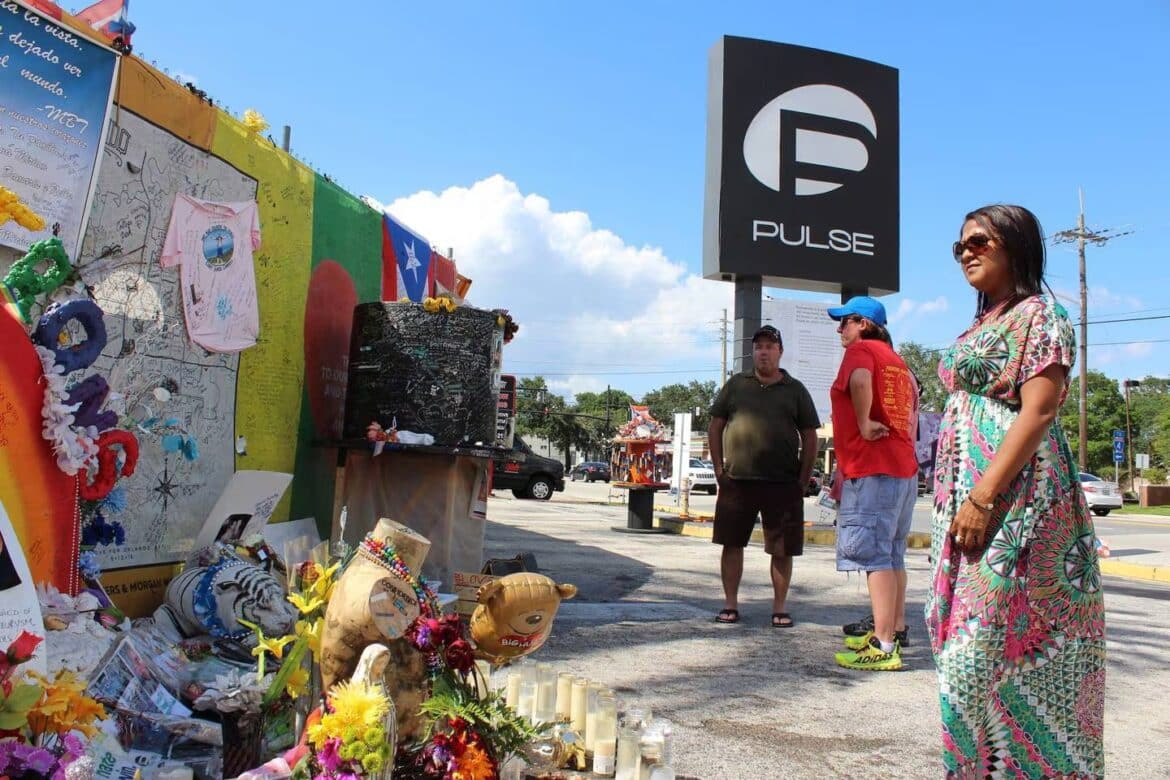It was going to be a memorial and museum, with a wide, white tower, elevated in a spiral shape. It would be seen from several points in the city of Orlando, Florida, to remember the victims of the massacre at the Pulse gay nightclub in the early hours of June 12, 2016, when a man entered with a semi-automatic assault rifle and shot wildly at everyone.
However, there has been no groundbreaking eight years after the announcement of the project that would remember the victims of the deadliest attack against the LGBTTQ+ community in the history of the United States.
One of the victims was Puerto Rico native Anthony Luis Laureano, a 25-year-old professional dancer and drag performer. The night of the tragedy, Laureano was celebrating that the following Monday he would start working as a choreographer for the Telemundo television show La Voz Kids.
“But he didn’t start. He couldn’t fulfill that dream,” said Olga Disla, Laureano’s mother.
In the attack 49 people died at the Pulse gay nightclub, the majority were Latino; at least 23 of Puerto Rican origin. Dozens of Puerto Ricans and Latinos were also injured. It was the deadliest mass shooting in U.S. history, before another one took place at a music festival in Las Vegas in 2017, where 60 people were killed.
The perpetrator, a 29-year-old man named Omar Mateen, pledged allegiance to the jihadist group Islamic State, as revenge for U.S. military interventions in Iraq and Syria. This hate crime was also investigated by federal agencies as a terrorist act and classified as the worst on American soil after the attack on the Twin Towers in 2001. However, the perpetrator’s father, Seddique Mir Mateen, told NBC News that the attack on Pulse had nothing to do with religion, but with his son’s homophobia.
The memorial and museum to remember this tragedy was going to have a circular water reservoir that would create a mirror effect, 49 trees, vertical gardens, an educational center, plazas, a promenade, and a rooftop. It would cost $45 million. It was commissioned by nonprofit onePulse Foundation, established less than a month after the tragedy by Barbara Poma, owner of the nightclub where the massacre occurred.
Between 2016 and 2022, onePulse Foundation reported $11,259,492 in expenses for “services and programs” that included remembrance ceremonies, marathons, and student scholarships that were not directed exclusively to family members or victims of the tragedy, but to “all segments of society.” These expenses include $6,996,977 for the memorial and museum. But the project did not go beyond the design phase.
The official reason given by onePulse Foundation for canceling the construction of the memorial and museum was the increase in construction material costs caused by the COVID-19 pandemic in 2020. But the organization had been facing problems raising funds to finance the project long before its dissolution, channel WFTV 9 in Orlando revealed.
On December 28, 2023, onePulse Foundation began the process of dissolving the nonprofit organization. Poma’s last salary as “founder and former CEO” as reported to the IRS in 2022, was $249,580. This was $200,000 more than her first salary of $43,269 in 2017.
OnePulse Foundation was initially presented as a foundation to financially assist survivors and families of the victims . But it quickly took a profitable turn. The tragedy became an opportunity to generate income that vanished in high salaries, operational expenses, and in the planning and design of the memorial and museum that never got off the ground.
Most of the onePulse Foundation directors and executives were not representative of the LGBTTQ+ and Latino community they claimed to serve, they circulated information largely in English, and many of the survivors and family members never received any assistance from the nonprofit organization, the Center for Investigative Journalism (CPI, in Spanish) found.
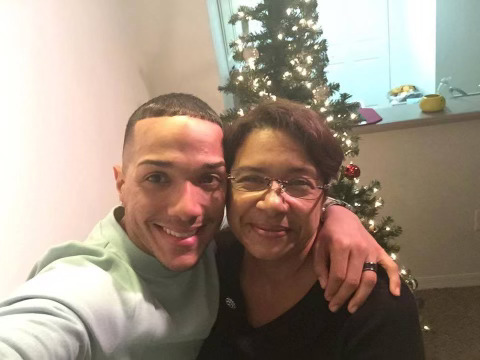
Courtesy photo
Disla, Anthony Luis’s mother, agrees that a memorial for the Pulse victims should be built, but she opposed the museum because she believed it to be expensive and was going to be in private hands. She was also skeptical that onePulse Foundation was chaired and directed by the owner of the nightclub where the tragedy happened.
“My concern with private ownership is that where there are private interests there is business. And I don’t think this is something that should be commercialized… As they say in Puerto Rico, it’s like putting a fox to safeguard the henhouse,” said Disla.
Some survivors of the massacre believe that the nightclub’s owners were negligent for allegedly not having enough emergency exits, which precluded some lives from being saved, as they argued in a lawsuit pending a court resolution. There is also a group of affected people who say there should be an audit and criminal investigation into the use of onePulse Foundation funds.
From Financial Assistance to Building a Museum
Martín Benítez worked at a car rental agency at the Luis Muñoz Marín International Airport in Puerto Rico. He wanted to make a change and decided to move to Florida with his partner, Michael Morales, who worked as a nurse. Benítez decided to go back to school. They were together at the Pulse nightclub on the night of June 12, 2016. His partner Michael was injured by four gunshots but survived. Benítez died from the gunshot he received.
Martín’s sister, Nelly Benítez, says she did not get any financial assistance from the onePulse Foundation, other than a ticket to Florida for her and her mother, Miriam Torres, to attend a memorial event at a church, seven years after the tragedy.
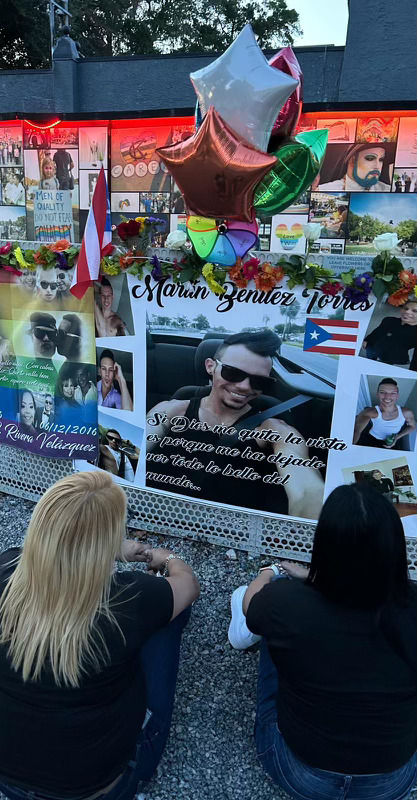
Courtesy photo
“They took us to a theater to remember the 49 victims and they spoke in English the entire time. So, we were lost,” said Benítez.
Between 2016 and 2022, onePulse Foundation raised $19,944,622 from private and government donors, as well as other income. Only 1% of that amount, $195,189, was allocated in 2016 as direct financial aid for people affected by the massacre. No more funds were allocated for direct financial assistance to victims and family members in subsequent years, according to IRS reports.
The year it was founded, 2016, one of the stated purposes in the report to the IRS was to “provide immediate financial assistance to victims affected by the attack” and “support the design, construction, maintenance and operation of a permanent memorial.” The following year, the part about providing financial assistance to victims was not included in the report, they added the idea of the museum and the goal of generating an estimated $30 million in capital.
Martín, Nelly Benítez’s brother, had gone to Florida six months before the tragedy happened. Before he left, he lived in the same house with her sister Nelly, now 43, and her two children. Another sister lived there as well, with her three children, as well as their mother Miriam in Río Grande. Martín was the youngest.
“He was ‘the dad’ of those five little kids. He was everything. He helped us, he worked, he was the man of the house as they say, the best support ,” said Benítez.
She recalled that onePulse Foundation staff visited Puerto Rico to participate in a day trip they organized in Cabo Rojo.
“What shocked me was that in that activity they told us that if we needed any type of help, from a psychologist or professional help, that we should consult with the Ricky Martin Foundation. It shocked me because I said, "But why Ricky Martin, if that’s what the onePulse foundation is for?”
The year it was founded, onePulse Foundation directors did not have an assigned salary. Between 2017 and 2022, they reported $4,789,591 in expenses for “salaries, employee benefits and other compensation.” In total, during the same period, Poma received $762,104 in salaries and compensation. Additionally, Poma and her husband, Rosario Poma, were beneficiaries of the $2 million sale of the Pulse nightclub land to the city of Orlando.
Since onePulse referred the Benítez family to the Ricky Martin Foundation for psychological help, they started noticing “many strange things.”
“Automatically I said hold on, we have to say ‘stop’, check what’s happening, because we don’t know much in Puerto Rico, although the majority are Puerto Ricans. Everything’s in Florida, and we don’t get information about it, we feel secluded,” said Benítez.
The family never received psychological or counseling services to cope with the tragedy.
“When we get a little down, we sit down as a family, we talk and it goes away, we go on because we have to keep going. But you know, my mother had a crisis, because of everything that’s coming to light [about onePulse Foundation], it isn’t easy and she’s seeing all that, which is like recreating the moment again,” Benítez said about the effect of the public controversy generated by the onePulse Foundation’s performance in Florida.
After seven years of fundraising, onePulse Foundation ended up insolvent, according to the dissolution document filed with the Florida Department of State. The document does not report any money left in the nonprofit that needs to be transferred or returned.
The CPI tried to learn the position of onePulse Foundation staff, but there was no response despite attempts by different means, including calls, emails to an official onePulse address, requests for comments to Earl Crittenden, its last president, and to the law firm that represented them in their corporate dissolution process.
“We want to know, that justice be served, the whereabouts of the millions of dollars that Barbara Poma took, what she did with all the money, she profited from my sacred son and all the deceased,” said Martín’s mother, Miriam Torres, 70.
Martín Benítez was 33 years old at the time of the tragedy and is buried in the Cementerio Nuevo Municipal in Río Grande, a northern coast town in Puerto Rico.
Delta Air Lines did not charge to bring Martín’s body to Puerto Rico. And the Orlando Mayor’s Office covered part of the funeral expenses, except for the $1,500 pantheon that Benítez said they were supposed to pay for. “To this day there’s the debt [of the pantheon]; They [the Mayor’s Office] never responded,” Benítez said.
The Mayor’s Office Takes Charge and Hires an External Consultant
On the night of June 12, 2016, Yolie Cintrón, born in Arroyo, Puerto Rico, was going out to the Pulse nightclub, where a “Latin Night” and a drag show were being held. But her car didn’t start. She was all dressed up with no place to go at her house in Poinciana, in the Orlando metro area.
At around 2:00 in the morning, she started getting calls and text messages and saw the first news about the tragedy on television. She was spared but lost eight close friends and countless people she knew. Since then, she has been involved with the recovery process for victims and family members, which has been, in many instances, self-managed, without any type of help.
“I’ve had to take money out of my pocket to help survivors pay for medications… At one point I found myself alone with the Puerto Rican community, it’s a very sad thing,” said Cintrón, spokesperson for “Mothers of Pulse Victims and Relatives” and community leader. Now Cintrón, 61, doesn’t believe that the Orlando Mayor’s Office can fulfill the promise of creating the memorial for the Pulse victims.
“We don’t believe the City,” Cintrón said.
Following the dissolution of onePulse Foundation, the city of Orlando’s municipal government announced, on December 19, 2023, that it would assume responsibility for completing the construction of the memorial, through nonprofit organization Orlando United Pulse Memorial Fund. As of April, the Mayor’s Office had not yet named anyone to lead that foundation, Ashley Papagni, Public Information Officer for Orlando Mayor Buddy Dyer’s Office, told the CPI.
On April 9, the Mayor’s Office announced that it hired Larry Schooler, a conflict mediation specialist from Texas, to coordinate the participation of people affected by the Pulse tragedy in the design and planning of the memorial.
Schooler is a professor of conflict resolution and communication studies at the University of Texas at Austin. And he has experience working in the process of coordinating other mass shooting memorials in the United States. For his work with the Pulse community, he will use Spanish translators, according to the proposal presented to the Orlando Mayor’s Office. His contract is for $88,735, for less than four months
“They could have started building a memorial with that money. There isn’t much to discuss here, what we wanted is something simple, solemn, something beautiful, not Disneyland. That the tragedy that happened here be remembered so that it doesn’t happen again, Cintrón said.
Cintrón and the group of 12 mothers of victims and relatives whom she supports believe the coordination duties between the community and the Mayor’s Office, to get the memorial done, should have been assumed by the Director of the Office of Multicultural Affairs of the Orlando Mayor’s Office, Puerto Rican Luis M. Martínez. Martínez’s job for the mayor’s office is to serve as a liaison with the different communities of Orlando.
In late January, Cintrón wrote a letter to Martínez requesting a meeting. The response was for her to wait for the Mayor’s Office to start meeting with the community to include her.
The CPI asked the Mayor’s Office how much money they will allocate for the memorial. The response was that after purchasing the plot, where the structure of the former Pulse nightclub was for around $2 million, the Mayor’s Office has not set a specific cost for the development of the permanent memorial. The museum is not part of the memorial project that they propose to carry out, because the structure that the onePulse Foundation intended to develop had been designed for a plot of land that the Mayor’s Office does not own.
Forensic Audit Requested
“I haven’t gotten any help during these seven and a half years. What onePulse has done is raise money and do nothing. Only what the city [of Orlando] paid at the beginning for medical expenses and other aid,” said Jorshua Hernández Carrión, a survivor, shortly before the foundation was dismantled.
When the Pulse massacre happened, he was a manager at a McDonald’s and survived the shooting by hiding in the bathroom. “He shot the door and also did this, from above,” Hernández said, describing the shooting. Two bullets, which apparently were already weak, entered his body, but did not come out.
Hernández returned to Puerto Rico in 2022 but has stayed in touch with a group of survivors and family members and is one of the most vocal survivors condemning the onePulse Foundation. Hernández and other family members and survivors who came together under the Community Coalition Against a Pulse Museum are demanding a forensic audit of the OnePulse Foundation and a criminal investigation of Barbara Poma.
“The problem that Onepulse has in the public eye is that it has been unethical. But unethical doesn’t always mean illegal,” said Anna Eskamani, representative of the 42nd district, which includes parts of Orlando, in the state legislature.
Eskamani asked the State of Florida’s Joint Legislative Audit Committee to conduct an audit of onePulse Foundation. But, because onePulse Foundation was a private entity, the state lacks jurisdiction to conduct an audit. They can only audit money they received from public funds, and the portion of that money that onePulse Foundation had not yet spent was returned to the government at the time of its dissolution.
The representative said she wants to ensure that the new Orlando United Pulse Memorial Fund entity that the city of Orlando will manage to build a memorial is representative of the people affected by the tragedy and that it is bilingual.
“One of my criticisms that I share with the city is that so much of the information has been provided in one language, with English being that dominant language, and that’s a disservice to many of our Pulse families who do not feel like they can participate,” Eskamani said.
Disla, Anthony Luis’s mother, was at one of the public hearings where the purchase of the Pulse land was discussed. There was a translator there.
“I speak English, but I need to speak my emotions in Spanish. The language problem has been key here. For example, in the memorial activity [carried out annually by onePulse Foundation] 90% was in English. They would say a prayer, an invocation and another in Spanish. Maybe one of the guests spoke a little Spanish and that’s it. The meetings were mostly in English. I think that at least in the last two that I’ve participated in through Zoom they had had a person to translate. But before that, not at all,” said Disla.
When the tragedy occurred, she got financial assistance from the Orlando Mayor’s Office. And she sought counseling and psychological guidance services at the Orlando United Assistance Center, an office founded by the Mayor’s Office with Orange County and the Florida United Way, to aid people affected by the Pulse massacre. She now receives psychological assistance through her private medical plan, Disla said.
Originally from Carolina, she was a teacher and academic coordinator at Dewey University in Puerto Rico. After the tragedy, her health deteriorated, and she retired. She now lives in Poinciana, Florida.
“[My son] is buried here, that’s why I live here. If not, I’d be in Puerto Rico,” said Disla.
For Rep. Eskamani, who has a master’s degree in nonprofit management, onePulse Foundation failed in its mission to create a memorial because of the ambitious vision they had, their corporate structure, and their desire to do something that was not what the survivors and family members initially wanted.
Do you have hope that the Mayor’s Office can do a better job?
“I do because the City must be accountable to the public. So, there’s going to be more transparency and there are more opportunities to influence the City than there is with a private company. But at the same time, there is a lack of trust and that really needs to be repaired,” Eskamani said.
Existing Memorials
After the tragedy, the Pulse nightclub fence was covered with flags representing gay pride, the trans community and Puerto Rico, shirts with signatures, candles, and flower arrangements. It became a spontaneous memorial.
That spot, 1912 South Orange Avenue in Orlando, Florida, was designated as a “national memorial” by U.S. President Joe Biden on June 25, 2021. The designation was made official with the signing of a law promoted by Florida Congressman Darren Soto. Puerto Rico’s Resident Commissioner in Washington, Jenniffer González, was one of the 19 co-sponsors of the law, which is four paragraphs long.
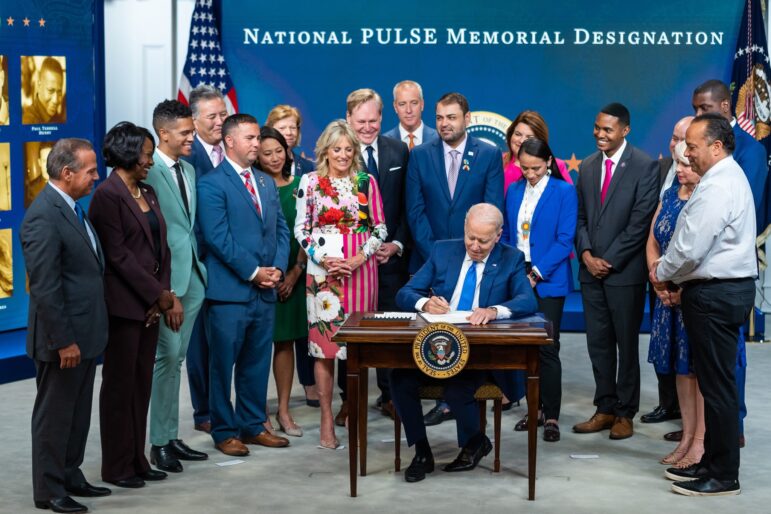
Photo taken from Facebook
The Act specifies that the designation of the Pulse nightclub site as a national memorial does not make it part of the National Park System, which includes other memorials and monuments, and therefore does not require or allow the directing any type of federal funds to be invested there.
“The deep wounds caused by the tragedy that occurred five years ago at the Pulse Club in Orlando are still very much alive within the community and in all those who were marked in some way by this terrorist act and hate crime. Honored to be able to be part of the designation of the Pulse Club as a national monument, as a place of remembrance for the victims of that atrocious attack on the LGBTTQ community where a large part was of Puerto Rican descent,” said Puerto Rico Resident Commissioner in a press release when President Biden signed the law.
The CPI asked González if, besides co-sponsoring this symbolic law, she carried out any other action in favor of the survivors and relatives of the victims of the massacre at the Pulse nightclub. She was also asked if she intervened in any way in Congress to oversee the nonprofit onePulse Foundation.
González, a candidate for governor of Puerto Rico and affiliated with the Republicans, a party that has introduced dozens of laws that decimate the rights of the LGBTTQ+ community, did not answer the CPI’s questions.
In December 2017, a maze-shaped public memorial was unveiled at Colonialtown Square Park in Orlando, an initiative of the city’s District 4 Commissioner Patty Sheehan. The memorial cost $60,000 and was paid for out of Sheehan’s budget.
In Puerto Rico, less than a month after the tragedy, the Municipality of San Juan awarded a $9,000 contract for the design, development, and installation of a memorial. It is in the Third Millennium Park in the El Escambrón area and includes a plaque that says:
“May this tribute to life reinforce our commitment to combat hate — a product of homophobia — with the love that produces respect. May our slogan resonate in all hearts: love is love, is love, is love…”
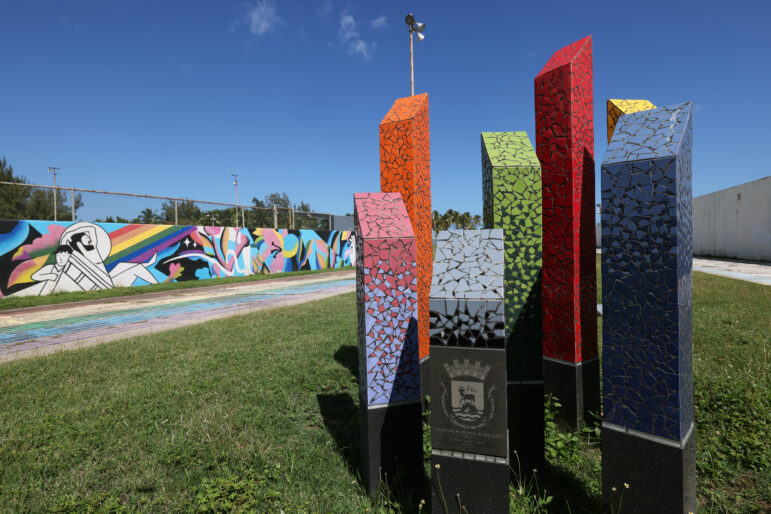
Photo by Brandon Cruz González | Centro de Periodismo Investigativo


